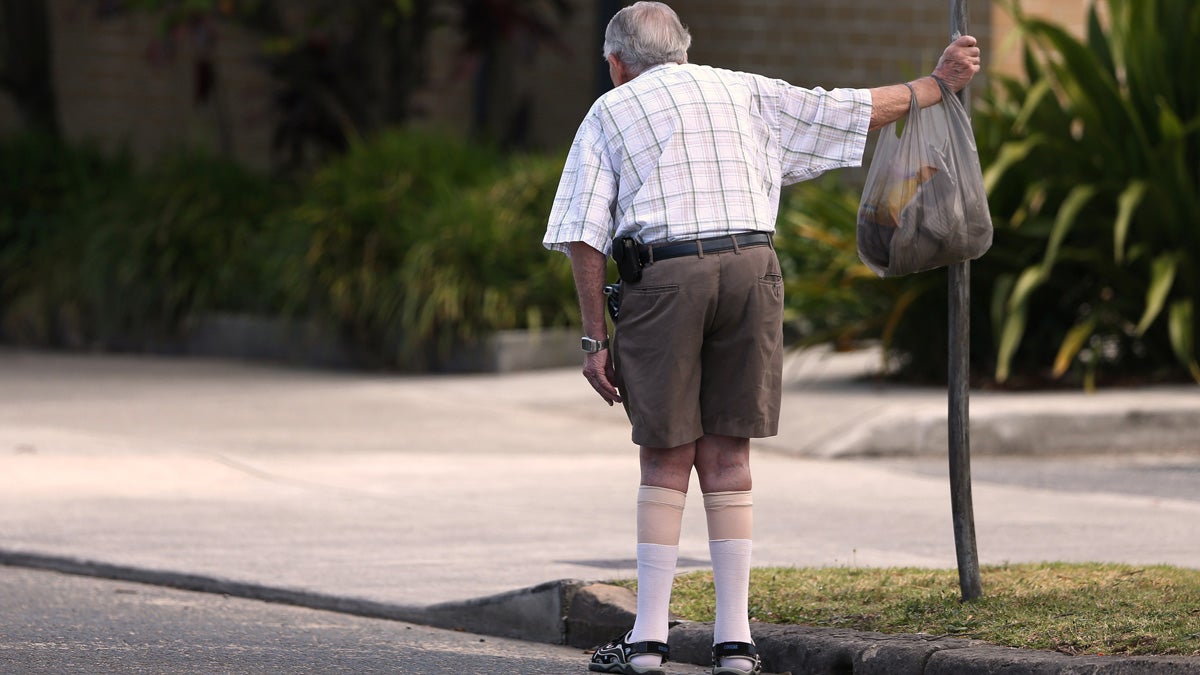Pa. program helps prevent falls for seniors

In this Oct. 11, 2013 photo, an elderly man holds onto a signpost on the side of a road in Sydney. About a third of people over 65 fall every year, according to the World Health Organization. (AP Photo/Rick Rycroft, File)
For older Americans, falling is a public health epidemic.
According to the Centers for Disease Control and Prevention, falls are the leading cause of fatal and non-fatal injuries in adults 65 and older. Since 2007, Pennsylvania has been offering fall-prevention training – called Healthy Steps for Older Adults – to those over 50.
For the first time, a study proved this program’s effectiveness.
“Folks in Healthy Steps had about a 17 percent reduction in the rate of falls,” said Steve Albert of the University of Pittsburgh, the first place to study the Healthy Steps for Older Adults program. From 2010 to 2011, researchers followed more than 800 participants and more than 1,000 control subjects in 19 counties, tracking falls and behavioral feedback.
Elizabeth Reuscher of the Peter Bressi Senior Center in Northeast Philadelphia saw the results firsthand. Last year she taught the program to regulars at Bressi.
“They did say … I went home and I had some newspapers on the floor near my armchair and I went home and picked them up right away because I didn’t know that was a danger,” Reuscher said.
It may sound trivial, but researchers say it’s making a measurable difference.
“Healthy Steps is different. Its [goal is] to reach as many people as possible with a fairly light intervention, to move the needle just a little bit, on fall risk,” Albert said.
Created by the Pennsylvania Department of Aging, Healthy Steps combines a mobility assessment with tips for reducing risk at home and exercises for lower body strength. Participants deemed high risk are referred to speak with their doctors for more personalized assistance.
Community-based senior centers around the state offer the four-hour workshop at no cost to participants.
The CDC estimates that falls result in $30 billion in direct health care costs each year – and that number is rising.
To find a Healthy Steps training in your area, contact your local Area Agency on Aging.
Reducing risks
The CDC has some tips for reducing the risk of falls:
Exercise regularly. It is important that the exercises focus on increasing leg strength and improving balance, and that they get more challenging over time.
Ask your doctor or pharmacist to review your medicines — prescription and over-the counter — to identify medicines that may cause side effects or interactions such as dizziness or drowsiness.
Have your eyes checked by an eye doctor at least once a year and update your eyeglasses to maximize your vision. Consider getting a pair with single-vision distance lenses for some activities such as walking outside.
Make your home safer by reducing tripping hazards; adding grab bars inside and outside the tub or shower and next to the toilet; adding railings on both sides of stairways; and improving the lighting your home.
WHYY is your source for fact-based, in-depth journalism and information. As a nonprofit organization, we rely on financial support from readers like you. Please give today.

